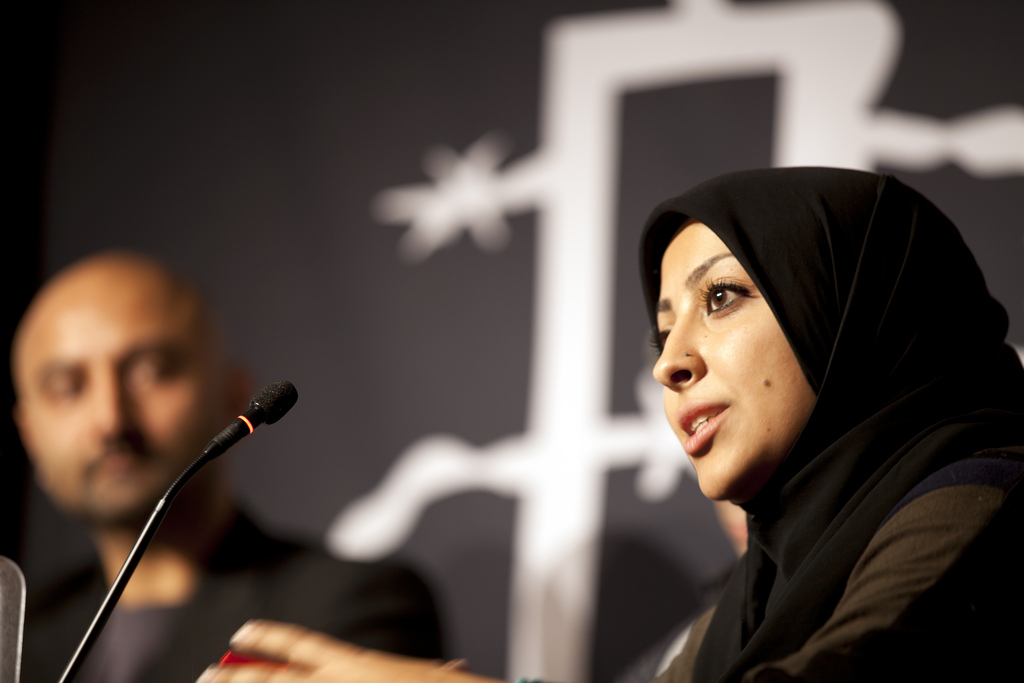The World Must Carry The Voice Of Maryam
by Equal Times / October 8, 2014 / No comments
On 30 August 2014, a dictator’s nightmare arrived in Bahrain. Prominent activist Maryam al-Khawaja flew home to visit her father Abdulhadi al-Khawaja, a renowned human rights defender and prisoner of conscience who has been serving a life sentence in Bahrain since 2011.
Abdulhadi had just entered his second hunger strike to protest against his detention, which the UN Working Group on Arbitrary Detention found to be arbitrary in 2012.
Maryam, who holds dual Danish-Bahraini citizenship, was arrested shortly after she landed in Bahrain and told that she was no longer Bahraini.
Maryam predicted her arrest a few months ago. Speaking to filmmaker Sharron Ward, she stated:
“…The reason why I am not going back [to Bahrain] right now is not because I don’t want to, it’s because I’m not allowed to. I have to make sure that the work I am doing on the outside can be managed by someone else before I can go back and be in a position where I know I might go to prison for a very long time”.
On arriving at the airport, Maryam was met and surrounded by security officers and a cameraman. She was held and informed that she was not welcome into the country despite showing them a Bahraini personal identification card (CPR).
Her Danish passport was confiscated and she was denied access to a lawyer. After tweeting her arrest, Maryam was tackled by four policewomen who tried to confiscate her phone.
A medical report has found that Maryam suffered bruises and swelling on her shoulder following the use of force by security officers.
Maryam’s sister and prominent activist, Zainab al-Khawaja, also faces trespassing charges for attempting to visit her father at the notorious Jau Prison.
Only this February was Zainab herself released from prison after one year in custody.
Abdulhadi has been repeatedly detained and tortured for promoting human rights in Bahrain. First as a student in the 1980s, and most recently as a result of Bahrain uprising of 2011.
He embarked on a hunger strike in 2012, lasting for 110 days before authorities tied him down, drugged him and force fed him – an operation which went horribly wrong and nearly cost him his life.
Just two weeks ago, Abdulhadi began another hunger strike to protest against his repeated arbitrary arrest and detention. After only two days, his health deteriorated. Experts warned that his current water-only regime could force him into a life-threatening coma in less than 15 days.
Maryam, who has been in exile in Denmark since 2011, risked her freedom to see her father before his own life failed him.
After spending the morning at the airport, Maryam was arrested and interrogated for several hours without the presence of a lawyer.
She was charged with “assaulting a police officer”, a common charge used to prosecute activists.
She was then transferred to Isa Town Women’s Prison, a place ill-famed for its ill-treatment of detainees.
During this time, her father’s health further deteriorated significantly. His blood pressure dropped and he is currently suffering from dehydration, a urinary tract infection and back pains.
Maryam has been remanded in prison ever since. On 6 September she was taken before a court judge where her arbitrary detention was extended for another 10 days, despite calls from UN experts and numerous NGOs for her immediate release.
Culture of impunity
The culture of impunity prevalent in Bahrain has allowed the government to imprison one of the most prominent human rights activists in the world.
Despite Bahrain’s unrelenting crackdown on human rights, Western governments, particularly the UK, continue to show unwavering support for regime.
Most recently, the UK Foreign Office claimed that “Bahrain is making substantial progress in respect for political reforms and will continue to receive our support”.
This statement came amidst an increasing number of legal amendments allowing for the banning of protests, the sentencing of activists and the revocation of their nationalities.
In July, the King of Bahrain approved new powers for the Ministry of Interior to revoke the nationality of anyone who “causes harm to the interests of the Kingdom or acts in a way that contravenes his duty of loyalty to it.”
Only recently, 10 people lost their citizenship after being sentenced without due process.
This is in addition to the revocation of 31 nationalities in 2012 for crimes relating to the freedom of expression. Some of those individuals, who have remained in Bahrain, are now facing charges for illegal residency and possible deportation despite being stateless.
To the government of Bahrain, Maryam Al-Khawaja is an inconvenience. She has been an outspoken critic of oppression and dictatorship, a passionate advocate for non-violent civil resistance and supporter of universal human rights.
For the past three years she has traveled the globe, both highlighting the repression in Bahrain and showing solidarity for human rights movements across the world.
She has seen the importance of internal change and has always wanted to go back to Bahrain to be a part of this.
In 2013, Maryam attempted to travel to Bahrain from Denmark. When she arrived at the airport, British Airways staff informed her that she would not be allowed to board the flight at a request from the government of Bahrain.
It is imperative now that the world carries the voice of Maryam.
Time and time again, the Bahrain regime has demonstrated its intolerance for any dissent. Activists like Maryam, her sister and her father know the grave risks they face, yet they continue to fight for freedom.
It is incumbent upon western governments to speak out against allies who fail to respect even the most basic tenets of human rights.
Until they do, the Bahrain regime will continue to imprison the voices of peace, freedom and democracy; voices that should be leading the state – not imprisoned by it.
This article was originally published by Equal Times on September 12, 2014.





